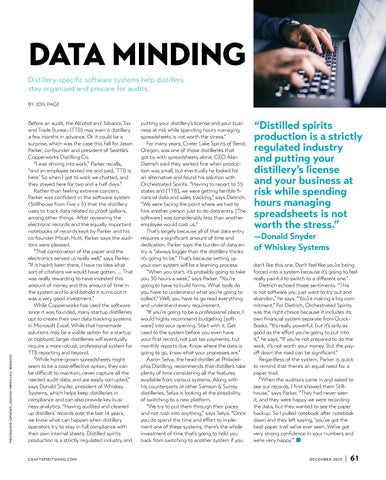business sense
DATA MINDING Distillery-specific software systems help distillers stay organized and prepare for audits.
PHOTOGRAPHS: (OPOOSITE, QUANTUM SPIRITS) KELLY BEDOLOTO
BY JON PAGE
Before an audit, the Alcohol and Tobacco Tax and Trade Bureau (TTB) may warn a distillery a few months in advance. Or it could be a surprise, which was the case this fall for Jason Parker, co-founder and president of Seattle’s Copperworks Distilling Co. “I was driving into work,” Parker recalls, “and an employee texted me and said, ‘TTB is here.’ So when I got to work we chatted, and they stayed here for two and a half days.” Rather than feeling extreme concern, Parker was confident in the software system (Stillhouse from Five x 5) that the distillery uses to track data related to proof gallons, among other things. After reviewing the electronic records and the equally important notebooks of records kept by Parker and his co-founder Micah Nutt, Parker says the auditors were pleased. “That combination of the paper and the electronics served us really well,” says Parker. “If it hadn’t been there, I have no idea what sort of citations we would have gotten. … That was really rewarding to have invested this amount of money and this amount of time in the system and lo and behold it turns out it was a very good investment.” While Copperworks has used the software since it was founded, many startup distilleries opt to create their own data tracking systems in Microsoft Excel. While that homemade solutions may be a viable option for a startup or hobbyist, larger distilleries will eventually require a more robust, professional system for TTB reporting and beyond. “While home-grown spreadsheets might seem to be a cost-effective option, they can be difficult to maintain, never capture all the needed audit data, and are easily corrupted,” says Donald Snyder, president of Whiskey Systems, which helps keep distilleries in compliance and can also provide key business analytics. “Having audited and cleaned up distillers’ records over the last 14 years, we know what can happen when distillery operators try to stay in full compliance with their own internal sheets. Distilled spirits production is a strictly regulated industry and
C R AF TSPIR ITSMAG.COM
putting your distillery’s license and your business at risk while spending hours managing spreadsheets is not worth the stress.” For many years, Crater Lake Spirits of Bend, Oregon, was one of those distilleries that got by with spreadsheets alone. CEO Alan Dietrich said they worked fine when production was small, but eventually he looked for an alternative and found his solution with Orchestrated Spirits. “Having to report to 35 states and [TTB], we were getting terrible financial data and sales tracking,” says Dietrich. “We were facing the point where we had to hire another person just to do data entry. [The software] was considerably less than another employee would cost us.” That’s largely because all of that data entry requires a significant amount of time and dedication. Parker says the burden of data entry is “always bigger than the distillery thinks it’s going to be.” That’s because setting up your own system will be a learning process. “When you start, it’s probably going to take you 30 hours a week,” says Parker. “You’re going to have to build forms. What tools do you have to understand what you’re going to collect? Well, you have to go read everything and understand every requirement. “If you’re going to be a professional place, I would highly recommend budgeting [software] into your opening. Start with it. Get used to the system before you even have your first record, not just tax payments, but monthly reports due. Know where the data is going to go, know what your processes are.” Aaron Selya, the head distiller at Philadelphia Distilling, recommends that distillers take plenty of time considering all the features available from various systems. Along with his counterparts at other Samson & Surrey distilleries, Selya is looking at the possibility of switching to a new platform. “We try to put them through their paces and not rush into anything,” says Selya. “Once you do spend the time and effort to implement one of these systems, there’s the whole investment of time that’s going to hold you back from switching to another system if you
“Distilled spirits production is a strictly regulated industry and putting your distillery’s license and your business at risk while spending hours managing spreadsheets is not worth the stress.” —Donald Snyder of Whiskey Systems
don’t like this one. Don’t feel like you’re being forced into a system because it’s going to feel really painful to switch to a different one.” Dietrich echoed those sentiments. “This is not software you just want to try out and abandon,” he says. “You’re making a big commitment.” For Dietrich, Orchestrated Spirits was the right choice because it includes its own financial system separate from QuickBooks. “It’s really powerful, but it’s only as good as the effort you’re going to put into it,” he says. “If you’re not prepared to do the work, it’s not worth your money. But the payoff down the road can be significant.” Regardless of the system, Parker is quick to remind that there’s an equal need for a paper trail. “When the auditors came in and asked to see our records, I first showed them Stillhouse,” says Parker. “They had never seen it, and they were happy we were recording the data, but they wanted to see the paper backup. So I pulled notebook after notebook down and they left saying, ‘you’ve got the best paper trail we’ve ever seen. We’ve got very strong confidence in your numbers and we’re very happy.’” ■
D EC EM BER 20 1 9
| 61
